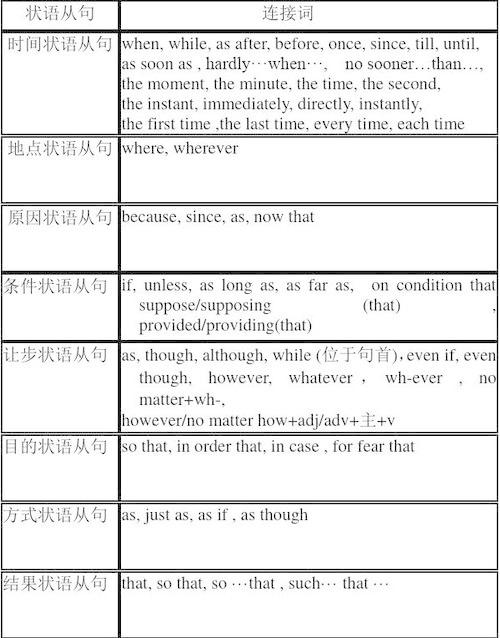状语从句是英语语法中的重要概念,用于修饰动词、形容词或副词。常见的状语从句包括时间状语从句(如when, while, as, after, before等)、原因状语从句(如because, since, as, for等)、条件状语从句(如if, unless, provided that, as long as等)和结论状语从句(如so that, in order that, such that等)。掌握这些语法知识可以帮助理解英语句子的含义和更准确地表达意思。

时间状语从句
时间状语从句是用来描述一个动作或事件发生的时间的从句,常见的引导词包括when, while, as, after, before等。例如:
- I will call you when I arrive in Shanghai.(我到上海后会给你打电话。)
- While I was walking in the park, I saw a beautiful flower.(我在公园散步时看到了一朵美丽的花。)
原因状语从句
原因状语从句是用来描述一个动作或事件发生的原因的从句,常见的引导词包括because, since, as, for等。例如:
- I couldn't sleep because it was too noisy outside.(我无法入睡是因为外面太吵了。)
- Since it's raining, we'd better stay at home.(既然下雨了,我们最好待在家里。)
条件状语从句
条件状语从句是用来描述一个动作或事件发生的条件的从句,常见的引导词包括if, unless, provided that, as long as等。例如:
- If it rains tomorrow, we will stay at home.(如果明天下雨,我们会待在家里。)
- As long as you work hard, you will succeed.(只要你努力工作,你就会成功。)
结论状语从句
结论状语从句是用来描述一个动作或事件的结果或结论的从句,常见的引导词包括so that, in order that, such that等。例如:
- I study hard so that I can get a good job in the future.(我努力学习,这样我将来可以找到一份好工作。)
- He speaks loudly in order that everyone can hear him.(他大声说话是为了让每个人都听得到他说的话。)

